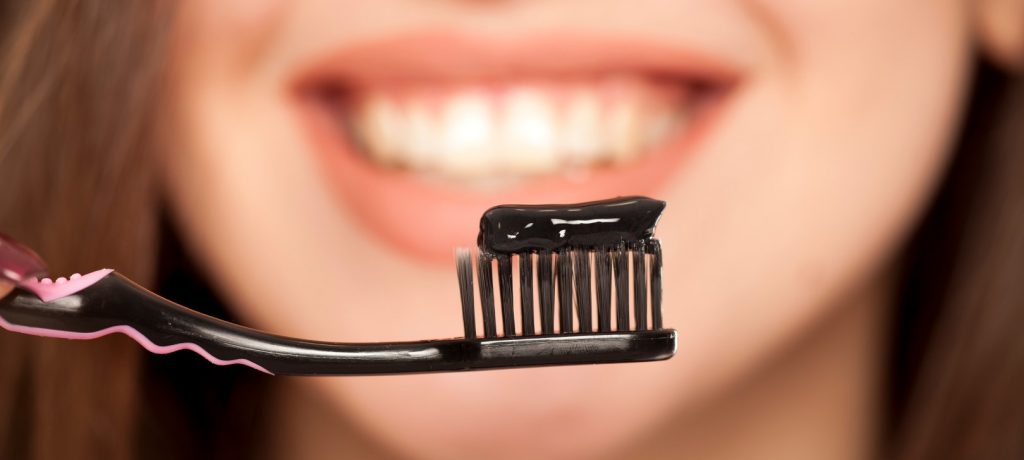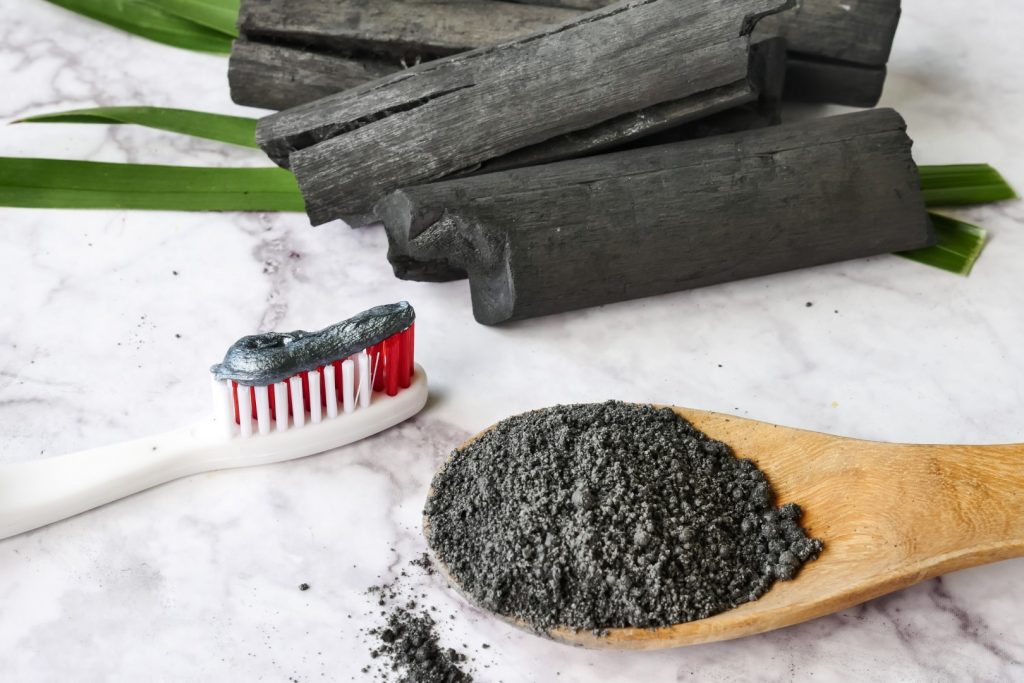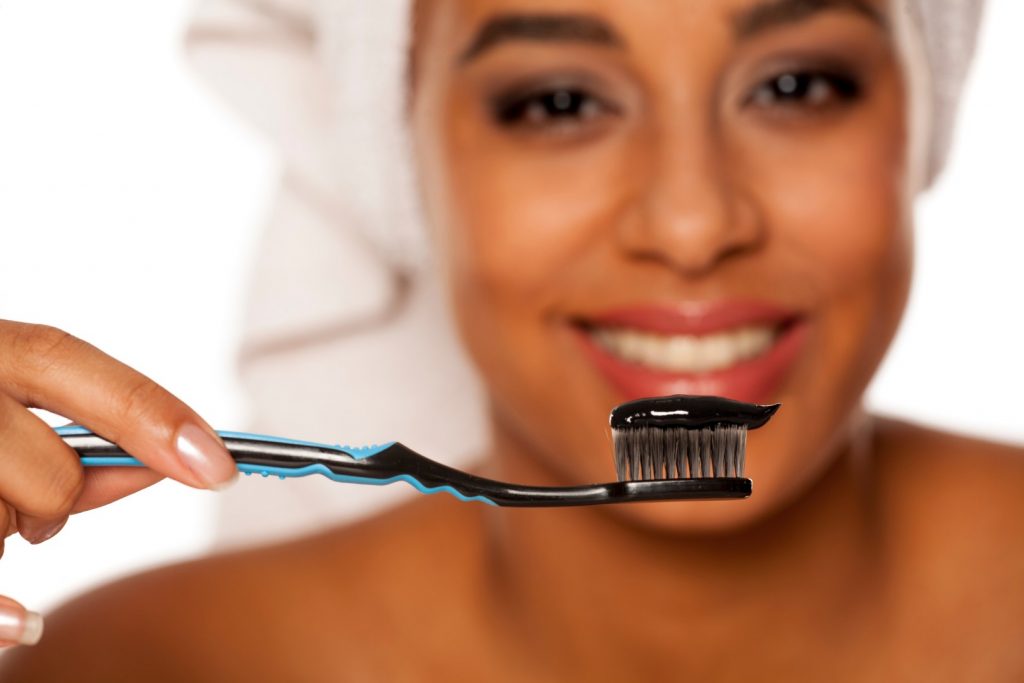Information Library
Start Reading

Charcoal is good for garden mulch and compost heaps. It’s good for freshening air and filtering tap water. It’s great for grilling hamburgers. But is charcoal good for your teeth?
Activated charcoal has become popular as a way to whiten teeth. It’s widely touted as a safe, effective alternative to traditional whitening products and treatments.
But does charcoal toothpaste really work—and is it really safe?
 Activated charcoal is a fine, black powder created by heating such carbon-rich materials as wood, coconut shells, or bamboo at extremely high temperatures. (We do mean “extremely”—1,100 to 1,600 degrees Fahrenheit.) This heating process creates tiny pores and increases the charcoal’s surface area. As a result, it can trap and absorb impurities and toxins.
Activated charcoal is a fine, black powder created by heating such carbon-rich materials as wood, coconut shells, or bamboo at extremely high temperatures. (We do mean “extremely”—1,100 to 1,600 degrees Fahrenheit.) This heating process creates tiny pores and increases the charcoal’s surface area. As a result, it can trap and absorb impurities and toxins.
Many people believe activated charcoal can absorb stains and discoloration from the surface of teeth. Indeed, ancient Romans brushed their teeth with charcoal (among other substances, even tree bark).
Advertising the supposed benefits of charcoal toothpaste, however, is a relatively “recent innovation.” People making toothpaste included charcoal as an ingredient as early as 19th-century England. But a toothpaste that included charcoal didn’t come to market until the 1930s.
When it did, the Council on Dental Therapeutics of the American Dental Association (ADA) found charcoal a “potentially harmful substance.” Fine charcoal particles could become embedded in the gums. Only surgery could remove them. The Council pronounced the toothpaste “not acceptable.”
Nearly a century later, charcoal toothpaste continues to gain traction, especially as a way to whiten teeth. Has new evidence about the safety and benefits of charcoal toothpaste come to light? Has dental professionals’ answer to the question “Is charcoal good for your teeth” changed?
 Scientific evidence supporting claims that charcoal toothpaste works to whiten teeth, or deliver any other oral health benefits, is limited.
Scientific evidence supporting claims that charcoal toothpaste works to whiten teeth, or deliver any other oral health benefits, is limited.
Because activated charcoal is abrasive, toothpastes containing it do have the potential to remove extrinsic (surface) stains from teeth. But these pastes don’t appear to whiten teeth as much as toothpastes containing bleaching agents (for example, hydrogen peroxide). They may not even whiten teeth as well as other pastes do.
“Toothpastes based on activated charcoal possess a lower whitening effect than other alternatives,” concluded one review of scientific research, “and can be considered as less safe due to its high abrasive potential.”
Too much abrasion can weaken and remove tooth enamel, leaving teeth more susceptible to damage and decay. It can also contribute to gums receding and exposing the surface of teeth’s roots.
Sometimes, charcoal toothpaste can make teeth look worse. Charcoal particles can accumulate in any cracks and crevices in the teeth. They can also build up in gaps between teeth and dental restorations, such as veneers or dental crowns. Gray or black lines around these restorations’ edges can make a smile less attractive.
Additionally, charcoal toothpastes often don’t include fluoride. Fluoride is vital to strengthening tooth enamel and fighting tooth decay. Charcoal toothpastes often don’t include fluoride because the charcoal will absorb it. Brushing with a non-fluoride toothpaste does nothing to help prevent cavities.
Finally, remember the federal government classifies charcoal as a carcinogen (a substance capable of causing cancer). Some charcoal toothpaste brands also contain crystalline silica, another recognized carcinogen.
No link between charcoal toothpaste and cancer has been proven. However, reducing exposure to carcinogens is always a step toward better oral and overall health.
Scientists lack sufficient clinical and laboratory data to verify claims that charcoal is good for your teeth. As Edmond R. Hewlett, DDS, told Consumer Reports, “There’s no compelling evidence at all of any advantage of using charcoal toothpaste.”
 At Penn Dental Medicine (PDM), we advise our patients to choose their toothpaste carefully. The known risks to your teeth far outweigh the purported but scientifically unproven benefits of charcoal toothpaste products.
At Penn Dental Medicine (PDM), we advise our patients to choose their toothpaste carefully. The known risks to your teeth far outweigh the purported but scientifically unproven benefits of charcoal toothpaste products.
Following the ADA’s recommendation, we urge patients to brush their teeth with fluoride toothpaste. Fluoride strengthens teeth to help prevent tooth decay and remineralizes enamel in tooth decay’s early stages.
If you want whiter teeth, many fluoride toothpastes contain modified abrasives or enzymes that will safely remove surface stains.
PDM also offers safe and effective teeth-whitening procedures, from in-office treatments to prescription at-home products. And sticking to a schedule of professional cleanings will also help keep your smile bright.
For more steps to achieving a healthier and whiter smile, download our free flyer, “Cavities 101.” It contains detailed information about taking charge of your oral health.
You can also schedule an appointment with PDM online or by calling 215-898-8965.